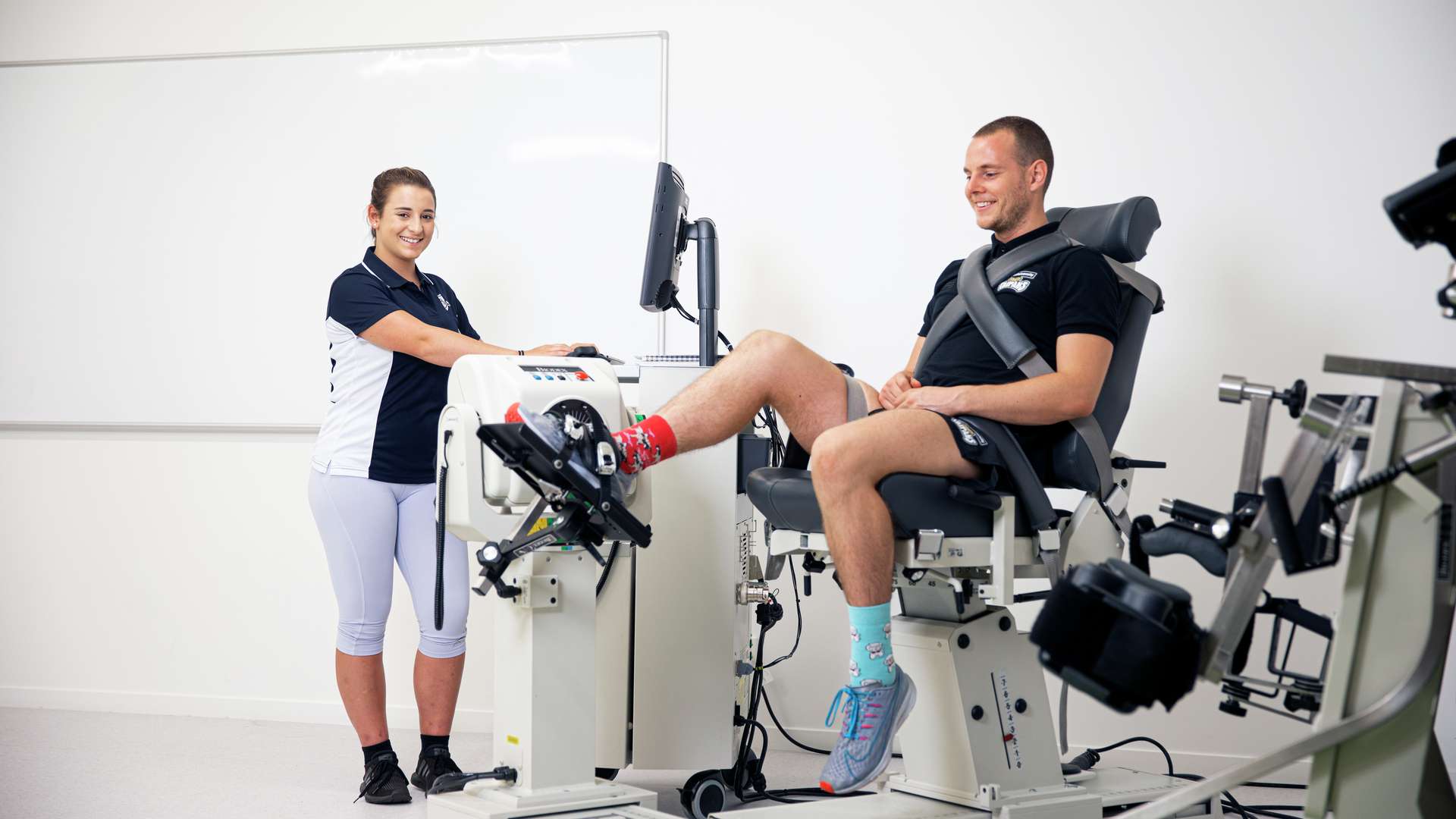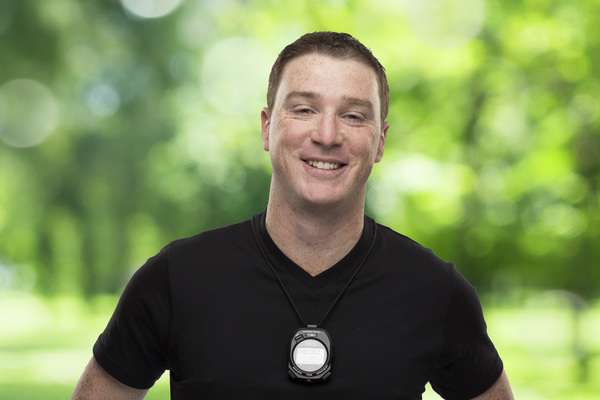
Study the Bachelor of Exercise and Sport Sciences and discover the diverse world of human movement – a field that applies to human fitness, elite performance, family and community health, lifestyle management, occupational health and safety and personal health.
The Bachelor of Exercise and Sport Sciences will equip you with practical skills in the various disciplines relevant to exercise and sport sciences such as anatomy and physiology, nutrition, exercise physiology, biomechanics, health and sport psychology, motor control and learning, and exercise prescription and delivery.
You will gain a comprehensive understanding of the processes and mechanisms of the human body as they relate to exercise and sport science and have the flexibility to pursue an area of interest, and can choose a minor in biomedical sciences, management and business or secondary teaching. Benefit from small class sizes and a personalised learning experience that caters to your individual needs, enabling you to graduate work-ready and with skills highly desired by employers. Your studies will include a mix of theory and hands-on laboratory experiences so you can apply what you have learnt directly into practice.
The Bachelor of Exercise and Sport Sciences includes work-integrated learning placements giving you exposure to real workplace environments. During these placements, you will apply skills learned throughout the course and gain practical experience conducting exercise assessment, prescription, and delivery for a range of populations. You may choose to study by online study while working in the industry, allowing you to earn and gain practical experience while you learn.
Discover more about our accredited exercise and sport sciences course, including 150 hours of work-integrated learning and practical experience. Click 'Explore Study Experience' for more information.

Sport science appealed to me because it's more analytical and research-based and has a firm grounding in science. It combined my love of sports with a research and knowledge base.
Liam Bromilow
Bachelor of Exercise and Sport Science
Completing the Bachelor of Exercise and Sport Sciences is your gateway into many diverse professions in Australia and overseas. Employment opportunities exist in areas such as:
Upon completion of the Bachelor of Exercise and Sport Sciences, you may also be interested in:
The course structure and available locations can change depending on when you want to study. You can choose the intake that best suits you in the drop-down menu below.
You must complete 24 units (144 credits):
The units you'll study are listed below. Click on a unit to learn more.
You will study the 18 units listed below.
The Biomedical Sciences Minor consists of six units, including the five listed below. For your sixth unit, you'll choose one unit from the following:
In this minor, you will advance your knowledge in areas related to exercise and sport science or pursue further studies in a health-related field such as physiotherapy, clinical exercise physiology, or medicine. Plus, this minor deepens your knowledge and skills in specialised areas of physiology and sports sciences such as cardiorespiratory, neurological, and sleep physiology, pathophysiology, sports injury prevention and management, and sports psychology.
To help you plan your studies and see which unit comes first, if one unit should be completed before another and the term you will study each unit, check out our course planners.
This course was awarded provisional accreditation (accreditation with conditions) by Exercise and Sports Science Australia (ESSA). Graduates of CQU’s Bachelor of Exercise and Sport Sciences between 30 October 2020 and 13 March 2026 (inclusive) can gain professional recognition as an Accredited Exercise Scientist with ESSA. CQUniversity is currently working with ESSA towards full accreditation and anticipate this will be granted in March 2026, which will be inclusive of students graduating up until 2029.
Note: When applying for accreditation through ESSA, Academic transcripts prior to 2020 must state ESSA accredited stream or be accompanied by a letter to confirm ESSA accredited minor was completed.
Students must complete a compulsory practicum experience with healthy populations under the supervision of a health professional. Placement hours will consist of a range of activities relevant to exercise and sport sciences and include exercise assessment, prescription, and delivery.
Students must complete a compulsory practicum experience with healthy populations under the supervision of a health professional. Placement hours will consist of a range of activities relevant to exercise and sport sciences and include exercise assessment, prescription, and delivery.
Students must complete an observational placement in a clinical setting where exercise is used in the assessment, treatment, or prevention of chronic or complex health conditions.
Your 150 hours of clinical placements are broken into three blocks*.
| Year | Clinical Placement Unit, Duration and Timing |
| 3 | Advanced Exercise Prescription and Delivery (ESSC13008)
Advanced Clinical Exercise Science (ESSC13005)
Professional Practice in Exercise and Sports Science (ESSC13009)
|
*Standard placement dates are used where possible, however are dependent on partner hosts and are subject to change. Placements may be part-time or full-time depending on confirmed arrangements with partner hosts. Generally, each placement is over a period of three to six weeks.
CQU coordinates placements for students. While we aim to keep you close to home, you may need to travel for your placement, and this travel is at your own expense. Clinical placements you complete as part of this course are unpaid.
If you have completed prior study relevant to units within this course, you may be eligible for credit for your past studies.
For your application to be considered, you must meet the following entry requirements.
View the student and course profiles for this course and learn about CQU's Undergraduate Profile for Term 1, 2025 via our Institute Profile.
CQU offers a range of alternative entry pathways to help you get started. If you don’t meet the entry requirements, there are options available, depending on your background and previous experience.
While not needed to apply, you'll need to meet the following requirements throughout your studies.
The Indicative First-Year Fee is the approximate cost of enrolling in this course for one full-time academic year (eight units over two terms) for a Commonwealth Supported Place (CSP) and should be used as a guide only. Your actual fees may vary depending on the units you select to study and your study load. Check the Cost per Unit spreadsheet available on our Understanding Course Fees webpage.
Fees are reviewed each year and are subject to change. Fee estimates for the following year are expected to be available in September each year.
This course has Commonwealth Supported Places (CSPs) available, and as a domestic student, you'll be offered a CSP, provided you meet CSP eligibility requirements. CSPs are subsidised by the Australian Government, meaning you are only required to pay the student contribution rather than full tuition fees.
You may be eligible for a HECS-HELP government loan if you are offered a CSP. HECS-HELP is an Australian Government loan scheme that assists you in paying your student contributions. Provided you meet the HECS-HELP eligibility criteria, you may use HECS-HELP to defer part or all of your student contribution fees.
Part of your course costs will include Student Services and Amenities Fees (SSAF). SSAF is charged in addition to your student contribution or tuition fees and is used to help enhance your study experience. There may also be other costs as part of your studies, such as textbooks, technology expenses, travel expenses, professional certifications, uniforms, or vaccinations.
We believe a quality education can be for everyone – regardless of background, location, or life circumstances. That's why we offer a variety of scholarships and bursaries that can give you a helping hand with a range of expenses and enhance your employability.
Check what you need to do to apply to study this course.
Prior to applying, take a look at important application dates and learn about our admission considerations, such as information for domestic students with overseas qualifications, indigenous support, and elite athlete, coach and performer support. You should also check out the adjustment schemes that might be available to you and how to access them. You can also explore our offer information to learn more about what happens after you've submitted an application and how to respond to an offer to study with CQU.
When applying through a tertiary admissions centre (TAC) you can use the relevant TAC code below to search for a course or add it to your application preferences.
CQUniversity Australia is a trading name of Central Queensland University
ABN: 39 181 103 288
RTO Code: 40939
CRICOS: 00219C
TEQSA: PRV12073